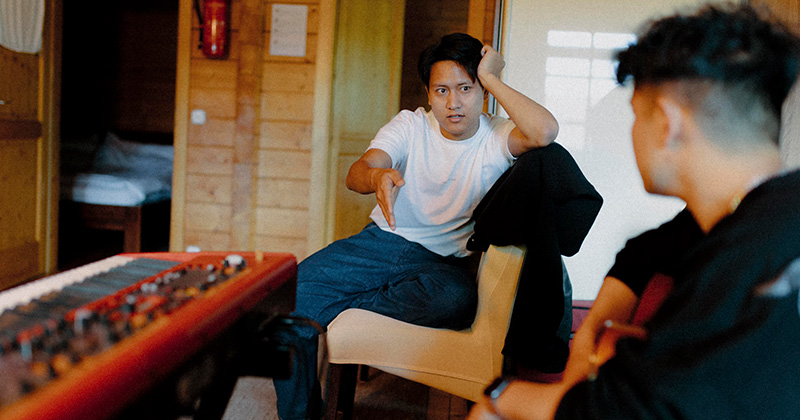Not many Indian artists can say they’ve co-written an anthem for one of Europe’s biggest music festivals. Fewer still can trace their journey from writing songs alone in a university dorm in Nagaland to collaborating with producers and songwriters from across the world in Budapest. But that’s exactly what one young songwriter from Dimapur did earlier this year, when he became the only Indian participant selected for the Songbook Songwriting Camp, an initiative tied to Hungary’s Sziget Festival.
“The first thing that hit me was the weather,” he says, laughing. “But beyond that, I was just excited. The drive from the airport to the camp felt like the beginning of something big—I was just eager to meet everyone and make music.”
The Budapest camp, which brought together artists from around the world, was not his first experience in a collaborative setup, but it was easily the most intensive. “The energy was unbelievable. Nobody was holding back. We were making music till 2–3 AM—not because we had to, but because we wanted to. Genre, language, geography—none of it mattered.”
Writing the Sziget Anthem
One of the standout moments of the camp was a co-writing session for a track intended to promote the Sziget Festival itself. Partnering with Hungarian vocalist Réka and producer Máté, he helped shape a high-energy anthem around themes like freedom and unity—core to the festival’s identity.
“Máté already had a sample ready, and I dove into the lyrics and arrangement. Réka nailed the vocals in minutes. By the end of the day, we had a full track. It was seamless,” he says. “Despite coming from different backgrounds, we were all honest about who we were—that made the collaboration work.”
From Nagaland to the World
For an artist whose formative years were shaped in a region often overlooked by the mainstream music industry, the opportunity felt like a breakthrough—not just for himself but for Northeast India more broadly.
“There’s so much talent in the Northeast, but we’ve never had the infrastructure or access,” he says. “We may look, dress, or speak differently, but we’re just as Indian. When I meet people abroad and say I’m from India, they’re often surprised. Music helps bridge that gap—and the Northeast has so much to offer in that regard.”
Raised in a close-knit community where authenticity is deeply valued, he sees those values reflected in his music. “We’re quite shy as a people, but also incredibly honest. That’s shaped how I write—I’ve always wanted to make music that’s true to who I am.”
Support from IPRS and TaFMA
His selection for the camp came via IPRS, who partnered with the Songbook Camp to send a representative from India. Their choice to select a relatively lesser-known artist from Nagaland instead of a bigger name speaks volumes.
“They didn’t have to pick me,” he says. “But the fact that they came to this side of the country and believed in my voice means everything. It wasn’t just a win for me—it was a statement about what’s possible when institutions invest in underrepresented regions.”
He also credits TaFMA—the Task Force for Music and Arts in Nagaland—for helping build momentum in the local scene. “They’ve done so much to bring visibility to artists here. Collaborations between organizations like IPRS and TaFMA can be a game-changer.”
What the Industry Still Gets Wrong
Despite these wins, he’s clear-eyed about the challenges. “We’re not asking for special treatment—just inclusion. There’s an abundance of polished, world-ready acts in the Northeast. All we need is for a few stakeholders—festivals, labels, streaming platforms—to bet on us. If one of us breaks through, the door opens for many more.”
He also believes that young artists need to do their part. “Talent alone isn’t enough. That’s one thing Budapest taught me. Every artist there was incredibly skilled, but they were still grinding. It reminded me that we can’t get complacent just because we’re good—we have to push harder.”
What’s Next?
Fresh off a successful headlining show in his hometown and with another in the works, he’s also juggling several post-camp releases, including potential international collaborations with peers from the camp.
“It’s an exciting time,” he says. “I’ve come back from Budapest more inspired than ever—to make more, do more, and hopefully, help build a bridge between Nagaland and the world.”
Source:https://www.musicplus.in/inside-the-journey-of-an-emerging-songwriter-from-nagaland-to-sziget-festival/

